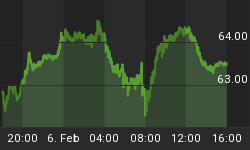The most pervasive question on Wall Street these days is if the Dow Jones Industrial Average, which is at a record level in nominal terms, reflects strong corporate profits and an improving economy; or simply has been achieved by the manipulations of the Federal Reserve. For me, this is sophomoric question to ask because, in reality, there can be no separating what the Fed has been able to achieve for the economy through its artificial measures and the effect it has had on corporate earnings.
The reason most market pundits claim that the Dow's new high does not represent a bubble in equities is because the price to earnings ratio is not out of line in historic terms. This is true. However, their specious reasoning assumes that the E in the PE ratio is genuine. In reality, the growth in earnings and the overall economy have been factitiously derived and are therefore unsustainable. To believe that stock prices are now fairly valued investors must also be convinced that massive deficits, free money and central bank debt monetization can be reversed without affecting the economy and corporate earnings.
There are short-term benefits derived from the Fed's ability to support real estate prices with their purchases of mortgage backed securities and manipulation of mortgage rates. Since most acknowledge the central bank is causing real estate prices to rise, can they also then put aside the fact that improving home prices helps boost the economy? If investors are forced into equities because the Fed caused real interest rates to become negative, doesn't that wealth effect from rising stock prices engender consumer confidence? When the Treasury issues $7 trillion in new debt and the Fed helps boost the money supply by 40% since 2007 in order to keep the consumption bubble afloat, doesn't that help corporate sales and profits?
I guess we can pretend when the Fed finally stops buying trillions of dollars worth of banks' assets and raises interest rates back to a normal level that corporations and the economy won't notice the difference. But it would be more prudent to conclude that once interest rates normalize the housing market will feel an extreme amount of duress because it will erode banks' capital and crimp lending. Whenever the Fed finally backs away from all its money printing, equity prices will suffer, as investors begin to receive a real rate of return on fixed income and their bank deposits. Rising interest rates will send service payments on corporate, private and government debt skyrocketing and that will severely hamper economic growth. The economic fallout from the end of artificial stimuli cannot (in the short term) be supportive of the level of corporate profits.
The bottom line is starting in 2008 the government began to bail out the crumbling asset bubble known as the real estate market, which also benefited the financial sector of the economy tremendously. This was accomplished by simply doubling down on the same philosophy that created the bubble in the first place; namely, money printing, very low interest rates and debt accumulation.
Therefore, what government has succeeded in doing is making the corporate and banking sectors appear to be solvent, while simultaneously bankrupting the Fed and Treasury. Since this is the case, investors should not take any solace in a PE multiple that appears not to be too far stretched. If market forces were allowed to prevail and the government permitted the economy to deleverage, earnings of U.S. corporations would be in a depression. And the price to earnings ratio would reveal that stock prices are already in a bubble. A bubble that is only becoming more dangerous with each day of the Fed's money printing.















